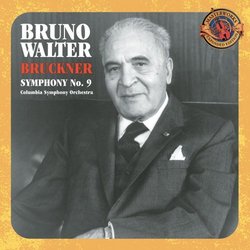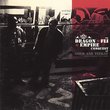| All Artists: Mack Harrell, Anton Bruckner, Bruno Walter, Martha Lipton, Columbia Symphony Orchestra, New York Philharmonic, Frances Yeend, David Lloyd Title: Bruckner: Symphony No. 9 Members Wishing: 0 Total Copies: 0 Label: Sony Release Date: 7/27/2004 Album Type: Extra tracks, Original recording remastered Genre: Classical Styles: Opera & Classical Vocal, Historical Periods, Modern, 20th, & 21st Century, Symphonies Number of Discs: 1 SwapaCD Credits: 1 UPC: 827969273722 |
Search - Mack Harrell, Anton Bruckner, Bruno Walter :: Bruckner: Symphony No. 9
 | Mack Harrell, Anton Bruckner, Bruno Walter Bruckner: Symphony No. 9 Genre: Classical
|
Larger Image |
CD DetailsSimilar CDs
|
CD ReviewsBruno Walter was authoritative in Bruckner, too. Alan Majeska | Bad Axe, MI, USA | 06/30/2007 (5 out of 5 stars) "Amazon customers who have read my reviews of Bruno Walter's recordings know of my admiration for him. He was 82 when I was born, and I was 3 years old when he died, but I became acquainted with him in the early 1970s through our library's LP records of his Beethoven 5th + Schubert 8th Symphonies, and Wagner Overtures and Preludes + rehearsal of "Siegfried Idyll". Walter's recordings are generally warm and loving, and some tempos in his later recordings could be a little faster: but everything always makes sense, and I always come away from listening to his work with a sigh, and a "that's so lovely" feeling, which is very pleasant. Those wanting a slashing, dramatic Bruckner 9 may have to look elsewhere. Walter's tempos are moderate in most cases, but always musical and sensible. II may be a little slow for some tastes. But the (Los Angeles) Columbia orchestra's strings are always rich, full, and really gorgeous. The 1959 stereo sound is wonderful: I LOVE this recording. The Bruckner TE DEUM, discmate to Symphony 9, is also excellent, and was recorded in New York in mono. It is clear, balanced mono, nearly as good as the stereo Symphony 9. Soloists and chorus are excellent, Walter's conducting very committed. Walter also recorded Bruckner's Symphonies 4 and 7 with the Columbia Symphony Orchestra. Walter's Columbia Symphony 4 is not as good as some other recordings (Karl Bohm/Vienna Philharmonic on Decca comes to mind) but is still very good. Walter's Symphony 7 is wonderful: one of the best, with great sound and playing by the Columbia orchestra. I highly recommend Walter's Bruckner 9th." A comment on the latest remastering Santa Fe Listener | Santa Fe, NM USA | 01/26/2008 (5 out of 5 stars) "Sony has touted its DSD remasterig as though it represents a significant step ahead of the last technnology, which was 96Hz/24-bit, which in turn was an advance over 20-bit SBM (if I have them straight). To a music lover like me who dabbles in audiophile sound, the proof is in the listening. So I bought this latest rendition of Walter's classic 1959 Bruckner 9th and comapred it with the 1988 budget version, on Sony's Odyssey line, always their standard for rock-bottom cheapness. The sonic differences aren't all that dramatic. Some tape hiss has been cleaned up, the overall timbre is more mellow, the strings (always thin-sounding with the Columbia Sym.) are marginally smoother. But the original LP was good, and various reissues on CD have been good as well. I was comfortable listening to both CDs, which isn't true with Karajan's recordings from the early Sixties, for example, where each new upgrade on CD has brought a marked improvement. Unless you are a stickler for the very best sound or happen to want the generous filler here, the Bruckner Te Deum, I think you can keep any previous incarnation of this performance and be well satisfied. P.S. -- Some audio researchers claim that once a digital recording crosses a certain low threshold of bits, added improvements aren't discernible to the average listener. In other words, an MP3 downloaded from iTunes satisifes most ears in comparison with CDs professionally manufactured and sold in stores. The point is worth keeping in mind when confronting new remastering technology." Sublime Bruckner 9th J. Grant | North Carolina, USA | 05/17/2008 (5 out of 5 stars) "Bruno Walter, along with Furtwangler, Carl Schuricht, Hans Knappertsbusch and Karl Bohm, are my personal favorite Bruckner conductors. This recording is a prime example as to why. He doesn't attack it the way Furtwangler does, but takes a more melodic, tranquil approach, which works for Walter. The remastered sound is also impressive for a 1959 recording. A very good alternative to this, if Furtwangler isn't your thing, is Wand's live recording with the Stuttgart Radio SO."
|

 Track Listings (10) - Disc #1
Track Listings (10) - Disc #1

